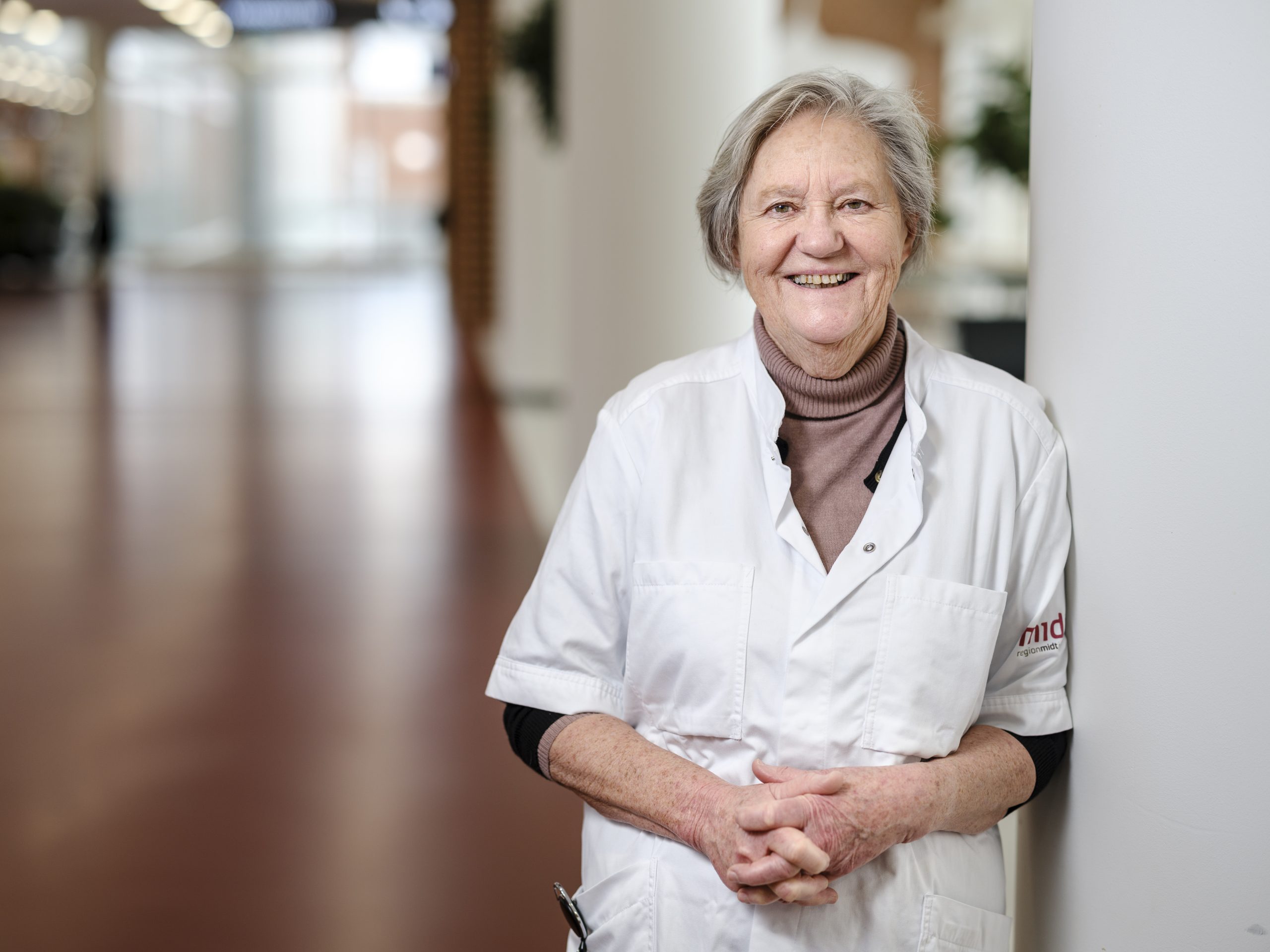The Danish Society of Internal Medicine and Novo Nordisk Foundation have awarded the 2023 Hagedorn Prize, accompanied by DKK 1.5 million, to Else Marie Skjøde Damsgaard, who has strengthened geriatrics and geriatric research in Denmark throughout her long career.
Frail older people with many comorbidities get much better care today from Denmark’s healthcare system than they did 40 years ago. One main reason for this is the great commitment and pioneering spirit that Else Marie Skjøde Damsgaard, chief physician and Clinical Professor from Aarhus University and Aarhus University Hospital, has put into this field over a long career.
In the late 1970s, when Else Marie Skjøde Damsgaard worked as a young doctor at Odense Hospital, the geriatric approach to frail older people with many comorbidities was not widespread in Denmark.
This is no longer the case, and today hospitals in Denmark generally apply a geriatric perspective when treating frail older people for a fractured hip, type 2 diabetes or cancer.
Else Marie Skjøde Damsgaard has contributed to ensuring this standard.
For her lifelong commitment to geriatrics, her courage in being pioneering in the field and her great ambitions on behalf of patients, Else Marie Skjøde Damsgaard is now receiving the 2023 Hagedorn Prize. The Prize is accompanied by DKK 1.5 million and is awarded by the Danish Society of Internal Medicine and the Novo Nordisk Foundation in recognition of excellent research or development efforts within internal medicine in Denmark.
“Else Marie Skjøde Damsgaard’s research and work have been absolutely crucial for the development of geriatrics in Denmark and for the strong collaboration across departments, specialties, sectors and hospitals within geriatrics today. With a relentless focus on what is best for frail patients, she has also inspired a whole generation of younger doctors and geriatricians to optimally serve the growing number of older people with very complex illnesses. This one of many reasons why we are awarding her the 2023 Hagedorn Prize,” says Pia Nimann Kannegaard, Chief Consultant and Chair of the Board of the Danish Society of Internal Medicine.
Else Marie Skjøde Damsgaard also thinks that geriatrics, which covers knowledge about the problems and diseases of old age and older people, is in a much better place today than it was in the past.
“I would venture to claim that becoming old today is better than it was in the past. In addition, geriatrics makes a difference in the healthcare system because we help to reduce the number of bed-days and improve the treatment and the services we offer today. No matter which hospital department you end up in, today they apply a geriatric perspective to frail older people, and this means that hospitalisation is now much shorter than 30 years ago. In 1995, an average patient stayed in the hospital for 35 days. Today, the average is 6 days,” says Else Marie Skjøde Damsgaard.
Wide-ranging research interests
Else Marie Skjøde Damsgaard’s career and research have been wide-ranging and addressed many aspects within geriatrics.
Very early in her research career, she demonstrated that giving older people medicine in pill boxes or in small bags improves adherence. Today this practice is quite common.
Else Marie Skjøde Damsgaard’s research has also focused intensely on how orthopaedic surgery and geriatrics collaborate regarding older people with fractures, such as a leg or hip.
This part of her research has shown that increasing the blood transfusion volume for the most frail people to more than is recommended reduces their risk of delirium and improves their survival and functioning. Many surgeons today have therefore also increased the volume of blood for the frailest patients.
A natural part of her research on fractures has also focused on exercise to ensure that frail older people do not fall with the accompanying risk of breaking a bone. This research has focused on developing approaches to exercise that work for frail older people – not just in theory but in real-life settings.
Finally, Else Marie Skjøde Damsgaard’s research has also contributed invaluable knowledge on following up people discharged from hospital. Research has unequivocally established that geriatricians monitoring patients after discharge reduces their risk of rehospitalisation significantly. This field has received considerable focus not only in Denmark but also abroad, and several research collaborations have been established in Denmark between municipalities, general practitioners and hospitals to identify how to best care for frail older people after discharge.
Else Marie Skjøde Damsgaard has initiated a new research project to investigate the effectiveness of faecal microbiota transplantation at home for patients with Clostridioides difficile infection.
“The legacy I would like to leave is that today we know that the complicated, comorbid and frail patients need geriatric intervention from specialists that focus on this field. This applies to both geriatricians and specially trained nurses, who carry out interventions that target the individual’s needs and are effective,” adds Else Marie Skjøde Damsgaard.
About the Hagedorn Prize
The Hagedorn Prize was established by the Danish Society of Internal Medicine in 1966 and is awarded at the Society’s annual general meeting to recognise excellent research or development efforts within internal medicine in Denmark. The accompanying award of DKK 1.5 million includes a personal award of DKK 250,000 and an award for research or development work of DKK 1.25 million. The Prize also includes the Hagedorn Medal.
About the Danish Society of Internal Medicine
The Danish Society of Internal Medicine, which has almost 4,500 members, is an umbrella organisation for the nine internal medicine specialties in Denmark. The Society aims to promote scientific research in internal medicine and the continuing education of the specialist physicians in the field. The Society was established in 1916 and has a Board of Directors of nine members selected by the boards of each of the nine internal medicine specialties.









